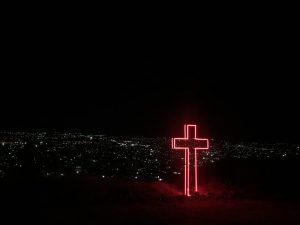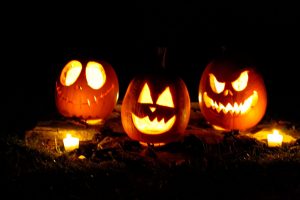Every year around this time, stores are flooded with Halloween décor, yards are decorated with anything from pumpkins to goblins, and Christians are left wondering how they should respond to Halloween.
Halloween is quickly becoming one of the most popular holidays in America. According to the Statista website, “…annual Halloween expenditure is set to reach an all-time high of more than 12 billion U.S. dollars in 2023…In 2023, more than 70 percent of consumers in the United States said they intended to celebrate Halloween.” (https://www.statista.com/topics/1727/halloween-in-the-us/#topicOverview).
The History of Halloween
In order to properly understand how a Christian ought to response to Halloween, it is important to go back and study the history of Halloween. Sadly, many people who think Halloween is all about trick-or-treating or candy or ‘innocent fun’, forget its dark past and occultic roots.
Consider its ancient origins:
According to Encyclopedia Britannica, “Halloween had its origins in the festival of Samhain among the Celts of ancient Britain and Ireland. On the day corresponding to November 1 on contemporary calendars, the new year was believed to begin…During the Samhain festival the souls of those who had died were believed to return to visit their homes, and those who had died during the year were believed to journey to the otherworld. People set bonfires on hilltops for relighting their hearth fires for the winter and to frighten away evil spirits, and they sometimes wore masks and other disguises to avoid being recognized by the ghosts thought to be present. It was in those ways that beings such as witches, hobgoblins, fairies, and demons came to be associated with the day. The period was also thought to be favourable for divination on matters such as marriage, health, and death.”(https://www.britannica.com/topic/Halloween)
“…on or about the 1st of November the Druids held their great autumn festival and lighted fires in honour of the Sun-god in thanksgiving for the harvest. Further, it was a Druidic belief that on the eve of this festival Saman, lord of death, called together the wicked souls that within the past twelve months had been condemned to inhabit the bodies of animals. Thus it is clear that the main celebrations of Hallowe’en were purely Druidical, and this is further proved by the fact that in parts of Ireland the 31st of October was, and even still is, known as Oidhche Shamhna, “Vigil of Saman.” On the Druidic ceremonies were grafted some of the characteristics of the Roman festival in honour of Pomona held about the 1st of November, in which nuts and apples, as representing the winter store of fruits, played an important part.” (https://www.britannica.com/topic/Britannica-on-Halloween-1996335)
It is undeniably clear that Halloween had its origins in ancient paganism. It was associated with death, darkness, and the occult.
Some may be surprised to learn that many modern-day Halloween activities are rooted in the ancient occultic practices of the Celts. Consider a few examples given by Frederick Suppe (a historian who specializes in Celtic and Medieval history):
The Jack-O’-Lantern
“The jack-o-lantern custom consists of placing fire—which imitates the good magic of the sun—inside a hollowed out vegetable, representing the harvest,” Suppe says. It was done “in hopes that the good magic will help to preserve the harvested food through the dark half of the year, until the next growing season could replenish the community’s food stocks.”
Trick-or-Treating
“…the practice of trick-or-treating originates in the Celtic custom of giving token bits of the harvest to spirits wandering outside of houses on the evening of Samhain, to placate them and prevent them from doing destructive things to the harvest or to homes.”
Consider its medieval modifications:
According to Encyclopedia Britannica, “In the 7th century CE Pope Boniface IV established All Saints’ Day, originally on May 13, and in the following century, perhaps in an effort to supplant the pagan holiday with a Christian observance, it was moved to November 1. The evening before All Saints’ Day became a holy, or hallowed, eve and thus Halloween.”(https://www.britannica.com/topic/Halloween)
When the Protestant Reformation came on the scene, Protestants were opposed to the celebration of Halloween. This refusal to celebrate Halloween was carried over into the New World where the celebration of Halloween was forbidden by the early American colonies who were largely influenced by the Puritans. The Puritans viewed Halloween as a Catholic holiday with pagan roots. Therefore, they strongly rejected it!
The celebration of Halloween came to America when large numbers of Irish immigrants came to America in the mid-19th century during the Irish Potato Famine. Roman Catholic Irish brought Halloween with them. Even then, Halloween wasn’t widely celebrated until the 1900s.
Over the years, Halloween has come to be associated with pranks, costumes, trick-or-treating, and Halloween parties, jack-o’-lanterns, skeletons, black cats, vampires, ghosts, and witches.
When one studies the history of Halloween, it becomes clear that it isn’t simply a time of ‘innocent fun’, but rather, is a holiday that is rooted in death, darkness, and the occult.
With that in mind, should a Christian partake in the celebration of Halloween?
Ephesians 5:11 says- “And have no fellowship with the unfruitful works of darkness, but rather reprove them.”
The word ‘fellowship’ means “to become a partaker together with others, or to have fellowship with a thing” (Thayer’s Greek Lexicon)
According to Bible, Christians should not partake in/have fellowship with that which is associated with spiritual darkness (that would include any glorification of death and darkness or any association with occultic practices such as witchcraft, divination, or demons)! Halloween glorifies the very things that Christians are called to separate from!
Sadly, many Christians still refuse to recognize Halloween as a holiday rooted in the occult!
In Their Own Words
Even professing witches and Satanists know that Halloween is an occultic holiday.
A Wiccan high priestess, Doreen Valiente (known as the ‘Mother of Modern Witchcraft’), said of Halloween: “Halloween is one of the four Great Sabbats of the witches that everyone has heard about. To witches, Halloween is a serious occasion, however merrily celebrated. It is the old Celtic Eve of Samhain.”
Satanist Anton LeVay, who founded the Church of Satan in 1966 and authored The Satanic Bible in 1969 called Halloween the third highest day on the satanic calendar for Satanists.
LaVey: “After one’s own birthday, the two major Satanic holidays are Walpurgisnacht (May 1st) and Halloween.” (The Satanic Bible, 1969, p. 96)
Throughout the month of October 2023, there is an event called “The Festival of the Dead” in Salem, Massachusetts. The event page refers to Halloween as “…the special time of year when the shades of the dead whisper from forgotten places and spirits walk among us…The Festival of the Dead beckons guests to step through the veil into a realm where spirits await.”(https://www.festivalofthedead.com/)
Even occultists and witches recognize the connections between the occult and Halloween! Halloween is undeniably associated with witchcraft, divination, and consulting familiar spirits (demons).
Light and Darkness Cannot Mix
Instead of asking, “Should Christians celebrate Halloween?”, maybe a better question is, “Why should a Christians celebrate a holiday that is rooted in paganism and promotes darkness, fear, death, and the occult?”
These things are in total contradiction to the Christian life that is associated with life and light!
Ask yourself the following:
Should Christians who have not been given “the spirit of fear” (2 Timothy 1:7) celebrate a holiday that is marked by fear?
Should Christians who are “children of light” (Ephesians 5:8) partake in a holiday associated with darkness?
Should Christians who are “passed from death unto life” (John 5:24) celebrate a holiday that is associated with death?
Should Christians celebrate a holiday that glorifies witches, wizards, and familiar spirits which the Bible calls an ‘abomination unto the LORD’(see Deut. 18:10-12)?
1 Thessalonians 5:22 makes it clear- “Abstain from all appearance of evil.”
What type of message is being sent to the world when Christians participate in Halloween? How can Christians celebrate a holiday associated with evil while avoiding ‘the appearance of evil’ at the same time?
Christians need to recognize that we are called to “…cast off the works of darkness, and…put on the armour of light.” (Romans 13:12). Ephesians 5:8- “For ye were sometimes darkness, but now are ye light in the Lord: walk as children of light.” 2 Corinthians 6:14 makes it clear that spiritual light and spiritual darkness cannot coexist in the same heart- “…what fellowship hath righteousness with unrighteousness? And what communion hath light with darkness.”
~Pastor Aaron Francis





